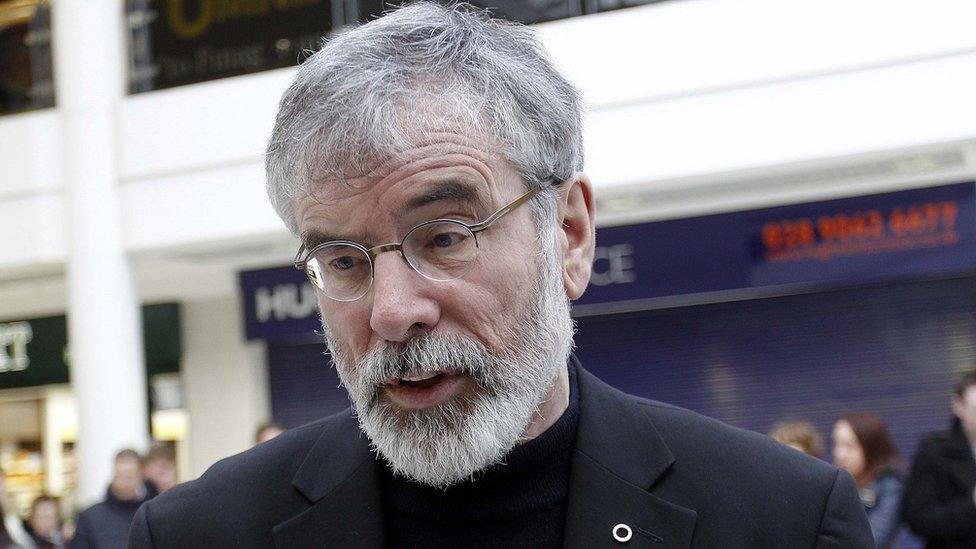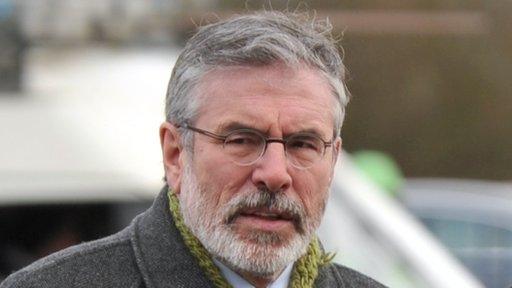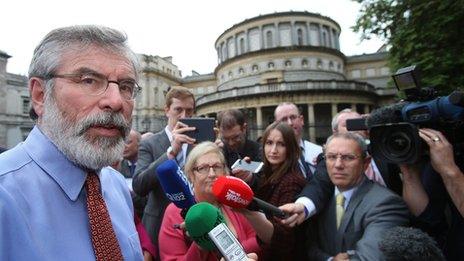Election profile: Gerry Adams, Sinn Féin leader
- Published

Gerry Adams has led Sinn Féin, Northern Ireland second biggest political party, for more than 30 years
Gerry Adams has led Sinn Féin, Northern Ireland second biggest political party, since 1983.
During the Troubles, some viewed him as a hate figure.
For others, he was a peacemaker - a man who shifted his movement from violence to peaceful politics.
He was born in October 1948 in Ballymurphy, west Belfast, to a family steeped in Irish republicanism.
He became an active supporter of civil rights.
In 1972, Mr Adams was interned - imprisoned without charge - but later released to take part in IRA ceasefire talks with the government.
In 1983, he became West Belfast MP on an abstentionist platform, refusing to take his seat at Westminster.
Soon after, he supplanted Ruairí Ó Brádaigh as president of Sinn Féin, an all-Ireland party. In 1986 Sinn Féin dropped its policy of refusing to sit in the Irish parliament.
Hume-Adams process
From the late 1980s onwards, Mr Adams was a key figure in the Northern Ireland peace process, initially following contact by the then-Social Democratic and Labour Party (SDLP) leader John Hume and subsequently with the Irish and British governments.
The Hume-Adams process eventually delivered the 1994 IRA ceasefire that provided the backdrop against which the Good Friday Agreement was brokered four years later.
That paved the way for devolved government in Northern Ireland.
Mr Adams won a seat for Louth in the Irish Parliament (Dáil) in 2011 after stepping down from his jobs at Westminster and Stormont.
He was re-elected in 2016.
After the election, Mr Adams said Sinn Féin met its own poll expectations, dismissing claims that he failed to lead his party to bigger targeted gains.
In October 2013, his brother, Liam Adams, was convicted of raping and abusing his daughter, Áine, in the 1970s.
.jpg)
Gerry Adams has consistently denied that he was ever a member of the IRA
The attorney general, John Larkin, subsequently concluded that the Public Prosecution Service was right not to prosecute Gerry Adams for allegedly withholding information about his brother.
In 2014, Mr Adams was arrested in connection with the IRA murder of Belfast woman Jean McConville in 1972.
He was freed without charge and a file sent to the Public Prosecution Service for Northern Ireland. Mr Adams has always strongly denied the allegation.
For years, Mr Adams has stated repeatedly that he has never been a member of the Provisional Irish Republican Army (IRA).
- Published1 May 2014

- Published2 October 2013

- Published26 February 2011
- Published14 November 2010